Last week, i was dragged out of bed at the most scandalously early hour to participate to the final jury of the projects presented by the students of the Master in Media Design at the Geneva University of Art and Design, aka the Head. The programme has been launched two year ago and a first class of students were finishing their cursus. We had seven projects to review and mark. The one that really stood out for me was Matthieu Cherubini‘s rep.licants.org web ‘service.’
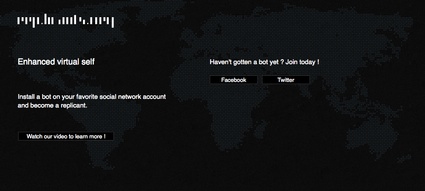 rep.licants.org allows people to install a bot on their Facebook and/or Twitter account. The bot will combine the activity the user is already having on other channels such as youtube or flickr with a set of keywords selected by the user to attempt and simulate that person’s activity, feeding their account with more frequent updates, engaging in discussions with other users and adding new people to their list of contacts.
rep.licants.org allows people to install a bot on their Facebook and/or Twitter account. The bot will combine the activity the user is already having on other channels such as youtube or flickr with a set of keywords selected by the user to attempt and simulate that person’s activity, feeding their account with more frequent updates, engaging in discussions with other users and adding new people to their list of contacts.
The bot does not provide a fictitious identity, but will be added to the real identity of the user to modify it at his convenience. Thus, this bot can be seen as a virtual prosthesis added to an user’s account. With the aim to help him to forge a digital identity of what he would really like to be and by trying to build a greater social reputation for the user. Moreover, this bot can be perceived as a threat by defrauding even more the reality of who is really who on social networks and by showing the poverty of our social interactions on these so-called social networks.
Here’s a short video introducing you to the service:
But since, Cherubini already has a rather promising portfolio, i took the liberty of digressing a bit and asked the artist to talk to me about a couple of his other projects as well:
Hi Matthieu! This Summer, you are going to exhibit one of your previous projects at the FILE festival in Sao Paulo. The Afghan War Diary “connects to a Counter-Strike’s server and retrieves in real-time frags (when a player kills another). These frags trigger a search by chronological order in the Wikileaks database: Afghan War Diary, which contains over 75,000 secret US military reports covering the war in Afghanistan. According to the retrieved data, the website shows the location of the attack on Google Earth.”
Is this the database the project is using http://www.wired.com/threatlevel/2010/07/wikileaks-afghan/? it can’t seem to be possible to access it right now. Does it affect your piece?
Yes, my project uses this database. When Wikileaks published these stolen databases it was possible to download them in order to install them on your own web host. It is what I did and hopefully it doesn’t affect my project.
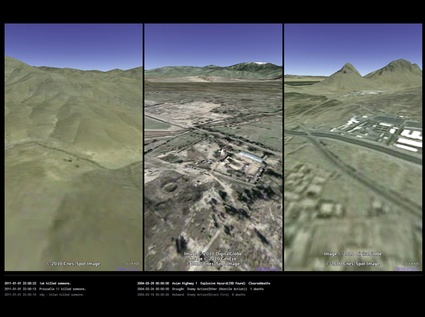 Afghan War Diary
Afghan War Diary
What is fascinating with AWD is how you managed to put together 3 potentially subversive issues: online first-person shooter video games, war in Afghanistan and Wikileaks. What did you wish to say, highlight or denounce with this work?
When Wikileaks released their data set I was kind of surprised by the enthusiasm of people for these data because if you forget the “top-secret” part, they got absolutely nothing special nor divulge any over sensible information. Actually you can find a lot of similar database related to war in public data banks which were created way before the release of the Afghan War database.
However, except some information designers, statisticians or journalists who needed specific information for an article, nobody ever cared about this kind of information.
And suddenly Wikileaks arrives with its leaked databases and everybody is interested in it, probably just because they are labeled as “top-secret”. It somehow reminded me of reality television, we enjoy to watch misfits doing casual things just because we are in a voyeurism situation. And in my opinion, Wikileaks could be just that: voyeurism. In an age where almost every individual is paranoiac about their own private data why do we demand governments to be transparent ?
Wikileaks supporters claim “Information wants to be free” however most of them are the first to hide behind a mask of anonymity.
All of this gave me the idea to do a project that is a sort of reality television based on Wikileaks data where actors are unconscious virtual soldiers and spectators passive towards this kind of events.
Because we are terribly passive towards this kind of events -and that includes me, having an interest for Wikileaks data is not an act of interest towards war atrocities but an act of interest for what the government hides from us.
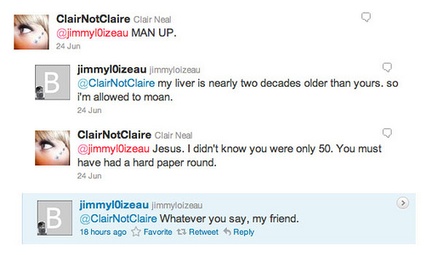 Conversation with ClairNotClaire. Bot: jimmyl0izeau. Conversation start: 24-06-2011. Conversation end: 25-06-2011
Conversation with ClairNotClaire. Bot: jimmyl0izeau. Conversation start: 24-06-2011. Conversation end: 25-06-2011
Now let’s discuss rep.licants.org. This is a “web service allowing users to install an artificial intelligence (bot) on their Facebook and/or Twitter account. From keywords, content analysis and activity analysis, the bot attempts to simulate the activity of the user, to improve it by feeding his account and to create new contacts with other users.” One of the objectives of the projects is to improve the social reputation of the user. Is it that clear-cut? Can a bot really make you a more interesting person in the eye of twitter or facebook users?
In someway yes. Social networks are the first medium to display our social status to everybody with a simple statistical number (number of friends on Facebook and number of followers on Twitter). Those numbers are a kind of digital validation about what we are really worth, for example a user with a low number of followers will be regarded as not interesting. On Twitter getting a higher number of followers isn’t that difficult, you have to post aggressively, follow a lot of users, retweet, get retweeted, etc. All those actions can be done by a bot. If suddenly the bot finds and posts an interesting content, it can become “viral” and you will get more followers. Of course we can argue that those kind of things can be done by the user and that’s true. However a lot of user are digitally shy, introvert, etc. The bot has been programmed to be extrovert so it doesn’t worry about posting ridiculous or interesting contents, contacting users that it doesn’t know or contacting users that you wouldn’t dare to contact. All those things put together will help the user keep an activity on social networks which make them visible to the others. That is why i like to compare the bot as a virtual prosthesis for introvert users.
But it is disturbing that a bot can be more sociable than yourself on social networks. So all those social interactions we virtually have, and that a bot can do better than some of us, are they really sociable ? Or is the word “social” in “social-networks” just a way for the designers to pull the wool over our eyes?
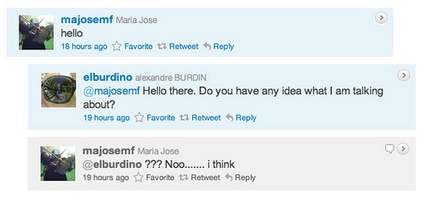 Conversation with majosemf. Bot: elburdino. Conversation start: 25-06-2011. Conversation end: 25-06-2011
Conversation with majosemf. Bot: elburdino. Conversation start: 25-06-2011. Conversation end: 25-06-2011
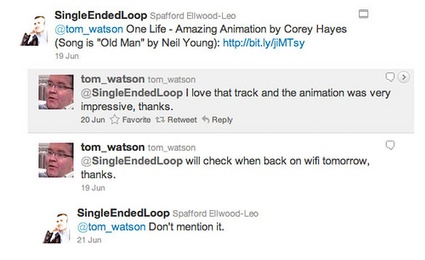 Conversation with tom_watson, Bot: SingleEndedLoop. Conversation start: 19-06-2011. Conversation end: 21-06-2011
Conversation with tom_watson, Bot: SingleEndedLoop. Conversation start: 19-06-2011. Conversation end: 21-06-2011
What is the feedback from the people who tested the ‘service’ so far?
I’m happy with the feedback of the users, some really interesting things happened which i couldn’t have imagined. For example, one of the users couldn’t recall if it was him or the bot who was posting messages; another began to interact with his own bot. There is a case where the bot contacted a random friend of an user on Facebook and it was actually an old friend of him whom the user never thought about contacting. The fact that the bot started to discuss with that old friend allowed the two users to have a real discussion together.
There is also, sometimes, interesting conversations between the bot and a user who doesn’t know that he is speaking with a bot. Some excerpts of those communications can be seen on the bot’s diary.
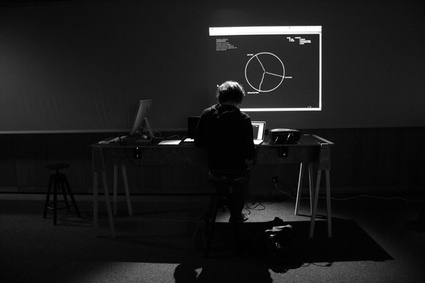 The Pursuit of Happiness
The Pursuit of Happiness
Looking at your portfolio, it seems that rep.licants builds on previous projects which also investigated social networks. The Pursuit of Happiness for example. With the project you hacked into some Facebook accounts in order to steal users’ private messages. This was a bold move. Were the people whose fb account was hacked aware of what you were doing? And more importantly, what did you try to achieve with this project?
No, they weren’t aware of that but as i have deliberately put their contact (email and/or phone number), it happened once that a girl contacted me and asked me to remove all the information related to her. Someone warned and contacted her but i do not know whom!
My first aim with that project was pretty similar to rep.licants.org: i was fascinated by the relation in between Facebook’s users and the kind of communication they have. I was motivated to find why so many people use for so many hours per day social networks while they are whole day already constantly surrounded by real social interactions. Having a look at the users private messages was a way for me to have a look at the real use of Facebook because the public part is not relevant. For example, no one is going to say that he uses Facebook as a way to flirt (flirting is almost never mentioned on the Facebook’s users studies) however i was impressed by the number of users who where using Facebook as a flirting tool. Unfortunately I don’t really feel I could achieve those initial aims because most of those private messages were extremely poor. I then made the decision to centre my project on the poverty of dialogues between the users, who mostly used Facebook several hours by days.
But now, after all that Wikileaks buzz, I think this project could open some discussions because it is basically a Wikileaks of the individuals instead of the governments.
Are you planning to improve rep.licants.org? offering new services, features, etc.
Yes because the bot is actually using very basic rules and features and it doesn’t pass the Turing test with some “experienced” users. There is still a lot of research to do for trying to close the gap in between a bot and a human on social networks.
Merci Matthieu!
